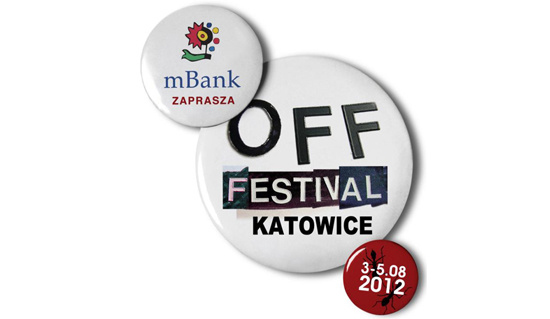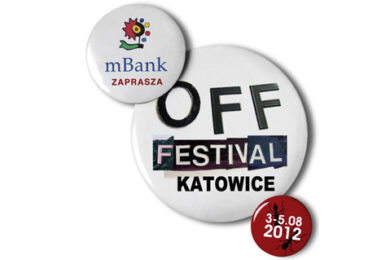As we’ve previously reported, Poland’s OFF Festival, which takes place this year from 2nd-5th August in Katowice, is unusual in terms of its sheer variety. There are few other places you’d be able to start your day with Converge, skip across to Kurt Vile, have a pint and then find yourself to another stage in time for Alva Noto & Blixa Bargeld, before rounding the evening off with sludgy techno from Andy Stott. And that’s just the first day.
The festival’s full line-up was recently announced, the full details of which can be seen here, and a stage-by-stage breakdown here.
This year, the Quietus were asked to curate the Experimental Stage on Friday, and we reckon we’ve got the best of the festival, with a line-up consisting of Demdike Stare, Alva Noto & Blixa Bargeld, Josh T. Pearson, Shabazz Palaces, Colin Stetson, Container, Obscure Sphinx and Kirk.
Elsewhere are headliners like Metronomy, Mazzy Star, Death In Vegas, Thurston Moore, Iggy & The Stooges, DOOM, Battles and Stephen Malkmus & The Jicks. The Experimental Stage plays host to some of the best acts of the weekend – in addition to Friday’s Quietus-curated showdown, it gathers the likes of Fennesz & Lillevan, Forest Swords, Ikue Mori & Kim Gordon, Kuedo and Shangaan Electro. Then elsewhere are other Quietus favourites, ranging from the dreamy stoner whirlpools of Bardo Pond to the taut post-punk of Savages, via DaM Funk, Group Doeh and the almighty SWANS. Something else the festival excels at is in showcasing Polish talent – we’d strongly recommend Kristen, whose music recalls 90s Thrill Jockey output from the likes of Tortoise, albeit with its own distinct twist.
OFF runs in Katowice from 2nd-5th August (tickets are available from here, and are about €40 for the entire weekend until 1st August). In advance, we caught up with festival founder Artur Rojek to discuss eclectic approaches to booking, how he put the festival together, and the development of the music scene in Poland.
Could you tell me a little bit about how the OFF Festival first started: what were your ideas for the festival when you founded it?
Artur Rojek: I’m just a normal music fan, and that’s why I do this festival: I’m one fan doing it for other like-minded fans. As clichéd as this might sound, I love sharing music with others. Even though I’m a swimming instructor by profession, music has always been my greatest interest in life. Of all the things I’ve ever studied, it’s music that has always come quickly and effortlessly.
I was still at university when I started the band with which I went on to release seven albums and play over a thousand shows all over the world over the next 20 years. I’ve been collecting music on a variety of media ever since I was in the fourth grade, and discovering something amazing is one of the best feelings I get when I listen to it. The next thing I want to do is to run over to a friend’s house and tell him about it. That’s what I’ve always done. Back then, it was just one friend to another, and now it’s an entire festival.
What would you say the overall attitude or ethos of OFF is all about? One of the main things that’s interesting about the festival is how wide a range of artists you book to perform, which is quite different to a lot of festivals in the UK for example.
AR: I think that contemporary alternative music and its audience are the result of the mixing and blurring of boundaries between genres. The old lines dividing fans of guitar pop, metal, and electronica have disappeared. Nowadays, there’s nothing weird about a Converge fan listening to Shangaan Electro. I look at my record collection, and there’s always this dilemma: what am I going to start my day with? (Andy Stott? Or perhaps Connan Mockasin?) And that drives me to do a festival that combines all these interests of mine, interests that have grown out of everything that surrounds us. The Quietus is an excellent example of that sort of eclecticism, and that’s why I wanted to work with you.
How has the festival developed over the time of its existence? Have things changed? What has improved? Have things been lost along the way?
AR: When we started out in 2006, I realized that I was coming out with the highly ambitious goal of promoting alternative music. Even to this day, Poland lacks strong and relevant media channels that would promote that kind of music, not counting public radio and a handful of websites. But the situation was even worse back then. There was little going on in our country concert-wise, aside from shows by homegrown artists. I don’t think it was until late 2009 and early 2010 that we started to see a real explosion of concerts by international artists. There’s a lot going on now.
Even though in 2006 we were a musical wasteland controlled by private media that were promoting bland, mainstream garbage, I decided that I was going to take a risk and use my position as a well-known Polish musician to get my foot in the door with an alternative project. My status was definitely a big help, but I was also risking a lot. After all, the whole thing could have just as easily been a flop.
But I kept at it, pushing my agenda in places where alternative culture hadn’t really been talked about before. I tried to convince everyone that just because something is alternative, underground, or independent doesn’t mean that it’s difficult and inaccessible. It’s a part of music culture that might require a bit more attention and concentration on your part, but it’s also much more satisfying and meaningful in the long run.
I went about organizing the festival in small steps. The first edition featured mostly Polish alternative bands. With time I started adding more and more international acts to the lineup. 2009 was a breakthrough year. That was the first time I chose a lineup that was very bold as far as Polish festivals go: instead of putting big local names on the bill, I had Polish bands that were relatively unknown at the time. The headliners were The National (this was before High Violent came out) and Spiritualized, who are by no means famous in Poland. Then there was Fucked Up, The Week That Was, Marissa Nadler, The Field, Wildbird & Peacedrums, Monotonix, Health, Micachu, Mark Kozelek, Wire, and many more. I had the best reviews and the worst turnout. But that didn’t deter me, and I took a similar approach in 2010, with The Flaming Lips, Tindersticks, and Dinosaur Jr. as headliners. Attendance has risen consistently ever since.
Could you tell us a little bit about the Polish music scene? Is it in a good state of health at the moment? We tend to learn bits about the music from Poland thanks to festivals like OFF and Unsound, but it’s rare to hear Polish bands played in the UK. Is part of the idea behind the festival to help show off Polish talent to a more international audience?
AR: I think that’s a problem that we’ve been facing for many years now. As a country, Poland aspires to show off its most talented musical acts. But if you don’t count Polish jazz and metal, we’re still waiting for that silver bullet to come along. The Adam Mickiewicz Institute has been doing a lot of good work by supporting talented artists and getting them exposure by sending them to all the corners of the globe. Still, we have yet to see anyone achieve spectacular success.
There are a few bands that have managed to achieve more or less short-lived recognition on the international scene. They’re exceptional artists that have made a name for themselves in recent years. I’m thinking of Skalpel, who came out with two records on Ninja Tune before disbanding, Jacaszek, who recently released an album on Ghostly International, and the Warsaw Village Band, which is probably Poland’s best known folk band.
There are some good things going on with The KDMS, who are on the Gomma label.
There are definitely more artists that deserve attention: Julia Marcell, Kamp, Paula i Karol, Moja Adrenalina, Ed Wood, Woody Alien, Kristen, and Kirk, to name a few. You’ll see most of them at this year’s OFF Festival.
The line-up this year is as varied as ever, and you’ve booked some amazing acts to play – Swans at midnight, outdoors, sounds like a huge proposition. Are there any acts or aspects of OFF 2012 you’re particularly looking forward to?
AR: I mentioned earlier that this is something I do as a fan for like-minded fans. It’s hard for me to pick out any specific acts, because I’m just as excited about seeing Daughn Gibson as I am about Swans. There are a few rare events that I’m really looking forward to, such as Chrome Hoof performing their own music to the Polish sci-fi film Hydrozagadka, a movie that’s just as insane as the band.
I don’t think I’d ever forgive myself if I missed Blixa Bargeld & Alva Noto, Pissed Jeans, Shangaan Electro, Group Doueh, Savages, Converge, and about 30 other bands.
For more information on the festival, head across to the OFF website



